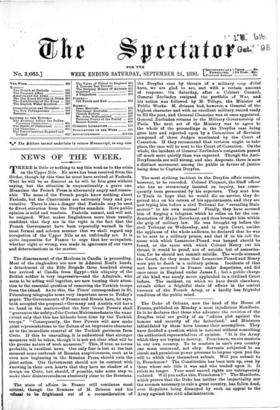The most striking incident in the Dreyfus affair remains, however,
to be recorded. Colonel Picquart, the Staff officer who has so strenuously insisted on inquiry, has conse- quently been persecuted by his superiors. They sent him to Tunis in hope that he would die on service, they de- prived hi a on his return of his appointments, and they are now trying him before a civil Tribunal for "revealing State secrets" to his own counsel! Finally, they have accused him of forging a telegram which he relies on for the con- demnation of Major Esterhazy, and thus brought him within the grip of military law. He was brought up before the civil Tribunal on Wednesday, and in open Court, amidst the applause of the whole audience, he declared that he was to be sent to a military prison, and that if in his cell the noose with which Lemercier-Picard was hanged should be found, or the razor with which Colonel Henry cut his throat, it would be proof, not of suicide, but of assassina- tion, for he should not commit suicide. The words stunned the Court, for they mean that Lemercier-Picard and Henry were put to death in a military prison. Incidents of that sort have occurred in France under despotisms, and did once occur in England under James I; but a public charge of the kind was surely never applauded in a civilised Court before. The incident, on which we have dwelt elsewhere, reveals either a frightful state of affairs in the central bureaux of the French Army, or a hardly less frightful condition of the public mind.






































